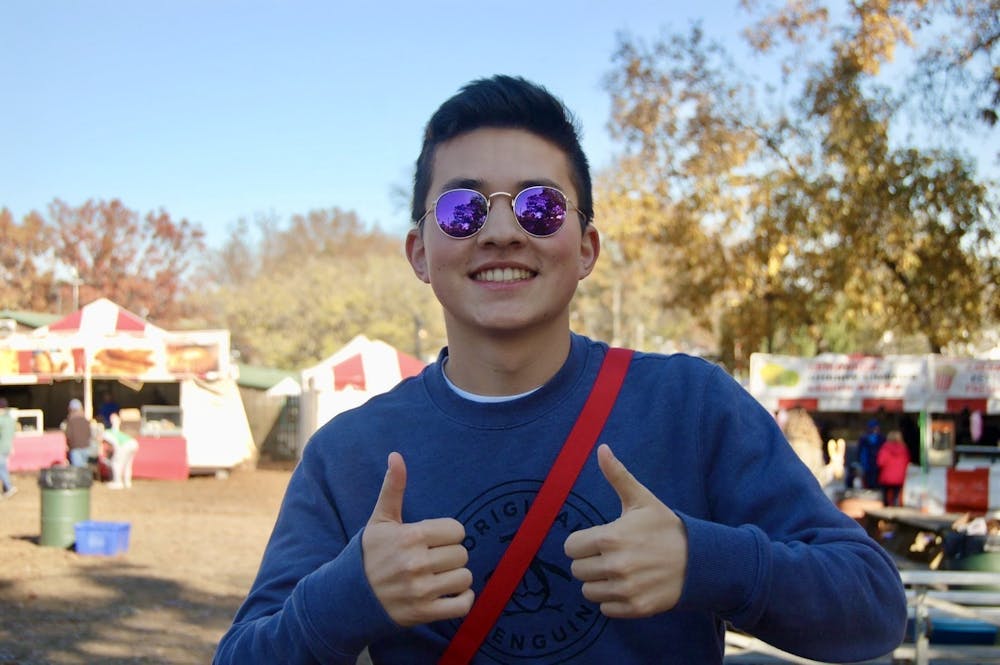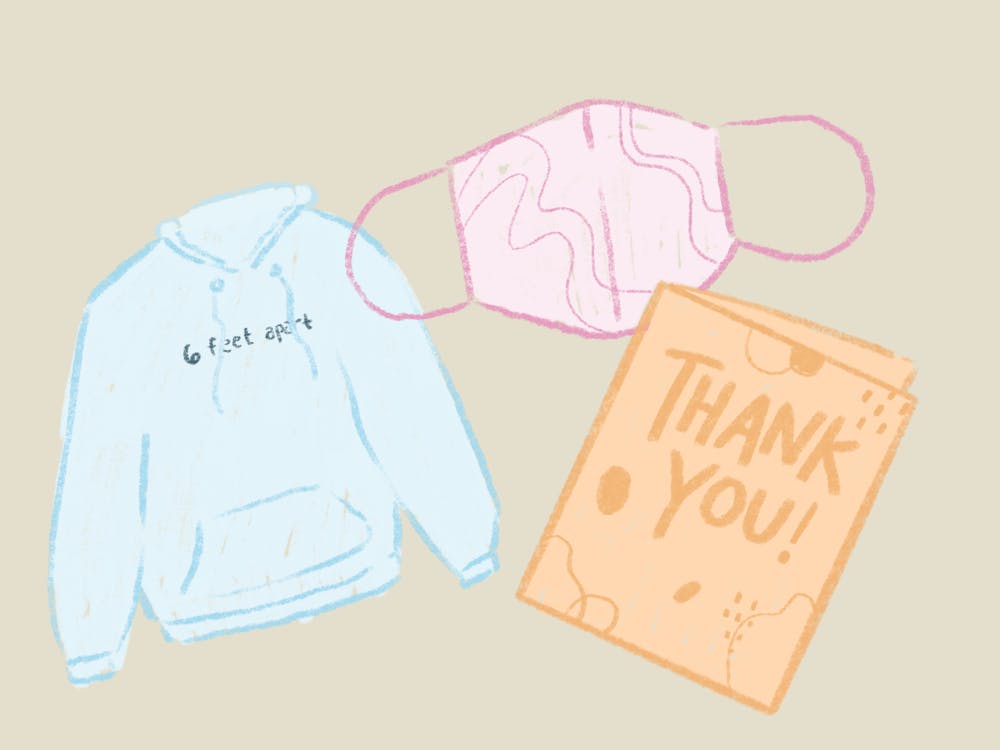The COVID–19 pandemic has scattered the Penn community across the globe—broadening the boundaries of our West Philadelphia home. Never before have we had such a unique and rare opportunity to create change across the larger world. And never before has it mattered more.
Walk down any residential street in America and you will likely find a house displaying a "Thank You Essential Workers" sign in its window. While understanding that these sentiments are in the right place, signs aren't enough to satisfy Joey Lohmann (C ‘22) who helped found Lockdown Letters, born on the principle that letter writing (and sometimes drawing) is the most authentic and personable way to show gratitude to our medical professionals and other essential workers serving on the frontlines of the COVID–19 pandemic.
As an aspiring pediatrician, Joey is a soon–to–be medical professional himself. Describing himself as “gung–ho about the premedical path,” he regularly volunteers at the Ronald McDonald House and leads MEDLife (Medicine, Education, and Development for Low–Income Families Everywhere).

The pandemic forced Joey back home to the Bay Area in the spring, where he immediately threw himself into COVID relief efforts in his hometown with the same kind of purpose–driven determination that he had put towards his premedical path while on campus.
"I’m drawn to studying anthropology not only because of the biomedical aspect of medicine, but also because I'm interested in how people are affected by treatments, viruses, illness, sickness, loss and pain."
Formed with six of his friends—Preethi Kumaran (C ‘21), Samira Mehta (C ‘21), Heta Patel (C ‘21), Youvin Chung (C ‘21), Rupa Palanki (C ‘21) and Cornell junior Lilian Hong—Lockdown Letters began in April to address the side of medicine that Joey is so fascinated with: providing a platform to send letters of appreciation to frontline workers serving their communities during the pandemic.
Joey—head of the marketing, public relations, and West Coast operations—explains: "I’ve always written 'thank you' letters. It’s something that my parents instilled in me. And people don’t send letters anymor…it’s old school. Through Lockdown, we wanted to create a genuine mode of sending gratitude that could be universal across the country.”
The organization has now facilitated the sending of nearly 8,000 letters to 92 institutions, including hospitals, clinics and, more recently, grocery stores in 37 American states. The only requirement of a lockdown letter is to express appreciation—whether that be a traditional message from an adult or a scribbled drawing from a toddler just beginning to grasp this new reality. Each one–of–a–kind letter is then transferred by Joey and his team to an official template and sent to a front line worker.
Going even further to foster a community bond that is collectively fighting isolation and honoring the sacrifice of healthcare workers, Joey recently had several letter writers record themselves reading out their letters; he then used these clips to create a short film that conveyed gratitude from people of all walks of life and ages for the sacrifices of frontline workers. One such person featured in the video was Doris, a seventy–three–year–old Penn alumnae and retiree who writes a letter nearly once a week.
"Everyone thinks 'this is their job,' but it’s not their job. It's not their job to experience a pandemic, to experience this much loss in a concentrated, short amount of time, to be separated from their families through it all. A lot of these doctors are being pulled from their surgical units…they are expected to be treating patients who are dying and being admitted at such a rapid pace."
As long as there are people on the front lines sacrificing their lives, there will be Joey telling their story.

Anika Bull (C ‘21) is running a mask shop unlike any other—a registered 501(C)(3) not–for–profit organization aiding underserved communities, a trendy shop changing the landscape of fashion, and a database for COVID–related news and research, all in one. Stir–crazy from quarantining at home and armed with a sewing machine, Anika founded Der Maskenladen, which means 'the mask shop' in German.
"I entered with very minimal expectations…I thought I’m going to start a mask shop, because why not? I started with Instagram—people were responding in the comments, saying, 'This is so awesome, I want to buy a mask.' I couldn’t keep up with the demand, so I asked if anyone wanted to join the team. I got a lot of traction with that. It grew a lot more than I originally expected."
For the first month and a half of Der Maskenladen, Anika did all the mask–sewing herself on top of her 40–hours–a–week internship. With the help of a family friend in high school, she was able to outsource production to a network of high school students in the Seattle area who could sew masks in exchange for school-required service hours.
"We created a volunteer portal and uploaded videos of how to [sew masks]. They all had to have sewing machines and they were able to produce a bunch of masks on their own.”
Now, the unique, handmade masks are supported by a dedicated team who help with growth strategy, Instagram content, graphics, news stories, etc., allowing the company to meet its growing demand. Yet the company remains true to its values—with 100% of mask sales going to the Urban League of Metropolitan Seattle (ULMS), an organization that empowers underserved communities in Seattle by providing housing, education, workforce development, healthcare, among other opportunities and services. Anika has had to find creative ways to cut costs. For example, in order to obtain the materials for the masks at low or no cost, she has reached out to fashion and interior designers in the Seattle Area.
In addition to their financial contribution, one of the guiding principles of Der Maskenladen is to spread awareness regarding COVID–19, so everyone can thrive amidst a new normal. Through the website’s Lookbook, Anika and her team have curated a photo gallery showing masks are much more than simply safe—they are a fun, spunky accessory to be personalized and worn with pride. Complimenting the gallery, The Newsstand features stories about the impact of COVID–19 on healthcare, the fashion industry and politics, so mask consumers are well–informed about the risks of the pandemic and empowered in their active choice to wear a mask.
"I just think wearing masks is such an easy thing to do and it can play such a big role in stopping the transmission of the disease. It’s proven to have an impact on the spread of the virus."
Although Anika realizes that it will be hard to keep up with mask production as she settles back into Philadelphia without her sewing machine for the rest of the school year, she remains optimistic. She intends to expand the volunteer network in Seattle and to potentially recruit high school students in Philadelphia. She also plans to continue to grow the Lookbook, write stories for the Newsstand and publish content on Instagram to normalize mask wearing.
After graduation, Anika will be working at a Life Sciences Consulting company, and reflects that her experience founding Der Maskenladen has reaffirmed her interest in entrepreneurship and taught her how to effectively manage a team and delegate tasks.

Photo courtesy of Lauryn Schweickart
Lauryn Schweickart (C ‘23) wasn’t interested in business before she applied to Penn, but by the time she completed her freshman year, she had successfully launched a mission–minded streetwear brand called 6 feet apart apparel. Described by Lauryn as an intersection between fashion and current events, the brand is known for its hoodies promoting safe social distancing practices.
She argues that the drive to start her company is a sentiment universally felt. We all want to make lasting change. "It doesn’t matter your age, where you’re from, your economic status or who your parents are. We are all experiencing this global pandemic together. It doesn’t matter if you are a celebrity or if you couldn’t pay your rent last month. It’s such a universal human experience." She continues by explaining her brand as akin to a time capsule, "People will be talking about this, our kids will probably be talking about this, and to be living in it and to have a piece of history, I thought was the backdrop of the brand."
In addition to its logo promoting the well–known CDC guideline, Lauryn wanted to create a product that would make a tangible difference. She chose to donate 50% of the profits of each sale to one of three COVID–related relief effort: GiveDirectly, Direct Relief and Feeding America—all organizations that Lauryn saw as tackling the multifaceted consequences of the pandemic, from a lack of proper personal protective equipment for healthcare workers to food insecurity.
Through Instagram and the company website, Lauryn's vision took off. Within two weeks of launching, Lauryn was able to break even and donate to the partner organizations. She was overwhelmed by the support she had received, especially from the Penn community, which she refers lovingly to as a “very entrepreneurial group.”
The brand took a brief hiatus in response to the death of George Floyd and protests in Chicago regarding police brutality. “As a person of color, I felt personally like I needed to handle it sensitively," she explained. "We were unsure if we wanted to promote a capitalist endeavor during a time where so much inequality is coming to light.”
However, in the past few weeks and after receiving messages of support from many to bring the brand back, Lauryn remains “passionate about the cause and the clothes” and is relaunching the company. She is planning to add more products, such as sweatpants and potentially, perhaps ironically, "full sweatsuits." Always an optimist, Lauryn sees remote learning as an opportunity for Penn students to embrace a more casual and relaxed lifestyle. She eagerly looks forward to the Penn community wearing her comfortable clothes to accommodate a slower pace of life.
Outside of the brand, Lauryn sees the new semester as an opportunity for self-reflection and relaxation. With the confidence she garnered from the success of 6 feet apart apparel’s first launch, she is excited to continue to explore the tantalizing world of social entrepreneurship.
"I’ve always had big ideas about companies I wanted to start," Lauryn says. "Putting those into actuality, I didn’t have the capital to do and I still don’t. But this was interesting because it was a product I could jump into—it made me see the next step and see the bridge between an idea and actuality. I was in the idea phase but hadn’t seen something launched. It made me really optimistic about starting a company."

